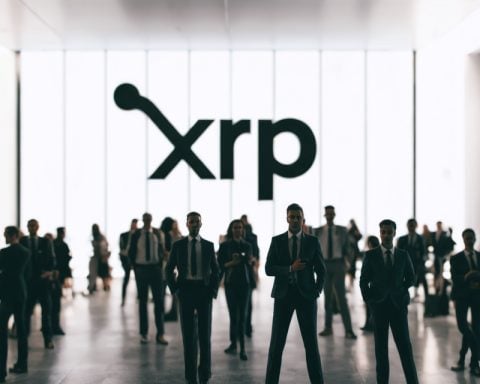- The SEC’s ongoing lawsuit against Ripple over XRP contrasts sharply with its faster resolutions with other crypto entities like Binance and Kraken.
- Ripple’s case reveals deeper complexities and has spurred debate, especially with Judge Torres’ pivotal judgment and a potential $125 million fine in the balance.
- Allegations of conflicts of interest within the SEC, notably involving former official Bill Hinman, add layers of intrigue and potential influence on the case.
- The SEC is showing signs of policy shifting, cooling its regulatory rigor, as seen in the withdrawal of charges against Coinbase and halting Robinhood investigations.
- The XRP case highlights the evolving nature of crypto regulation, with growing interest in XRP-based financial products marking a possible openness from the SEC.
In the intricate dance of crypto regulation, the Securities and Exchange Commission’s (SEC) handling of the XRP lawsuit is like an elusive waltz, stretching across the financial stage with unforeseen complexity. While the SEC strides confidently through resolutions with other crypto giants like Binance and Kraken, Ripple’s showdown with the regulatory titan remains in a state of expectations deferred.
Legal mastermind James Murphy, recognized by many as MetaLawMan, unveils the tangled narrative enfolding Ripple and the SEC. Unlike other crypto controversies, this case threads layers of intricate legal fabric, demanding negotiations far more elaborate. The presiding judgment by Judge Analisa Torres and a looming $125 million penalty hang like a spectral backdrop, casting uncertainty over every deliberation.
Whispers of internal strife within the SEC deepen the plot. Allegations whirl around former SEC official Bill Hinman’s entanglements with Ethereum-linked entities. Such conflicts of interest, like shadows in a courtroom, could inexorably tilt the scales of justice. With the Office of the Inspector General’s vigilant gaze, these allegations could not only reshape SEC’s legal strategies but also fuel fresh discourse on crypto regulations.
Tensions peak as the SEC, known for its enforcement zeal, eases into a new narrative—one that gestures towards policy adjustments over punitive actions. The recent withdrawal of charges against Coinbase and the cessation of investigations into Robinhood signal a strategic recalibration. As well-established financial entities propose XRP-based exchange-traded funds, the once-intransigent SEC appears to soften.
In this high-stakes engagement, like a chess match before grandmasters, timing is crucial. As legal winds shift, the XRP lawsuit encapsulates the drama of crypto regulation—a dance still unfolding, with each move under the watchful eyes of both jurists and the investment world.
The Ripple Effect: What the XRP Lawsuit Means for Crypto Regulation and Investment
How-To Steps & Life Hacks: Navigating the Ripple vs. SEC Legal Landscape
For investors and stakeholders trying to make sense of the Ripple lawsuit, here are some practical steps:
1. Stay Informed: Regularly check updates from trusted financial news outlets and the official Ripple and SEC press releases to stay ahead.
2. Understand the Terminology: Familiarize yourself with crypto and securities law terminology to better comprehend case developments.
3. Diversify Your Investments: Avoid putting all your resources in XRP; diversify your portfolio to mitigate risk.
4. Engage with Communities: Join forums or groups, like Reddit’s crypto or dedicated XRP communities, to share insights and gather diverse opinions.
Real-World Use Cases: The Impact on Crypto Adoption
– Exchange-Traded Funds (ETFs): The pending lawsuit has affected the launch and approval of XRP-based ETFs. Approval could lead to broader adoption and credibility.
– Cross-Border Payments: Ripple’s technology is already used for efficient cross-border transactions. A favorable ruling could see wider institutional adoption.
Market Forecasts & Industry Trends
Cryptocurrencies, tied to regulatory outcomes, experience volatile market trends. A positive settlement for Ripple could:
– Propel XRP’s market value significantly.
– Spur regulatory bodies worldwide to outline clearer crypto guidelines.
Despite the lawsuit, the crypto market is expected to grow, with forecasts indicating a compound annual growth rate (CAGR) of approximately 12.8% by 2028.
Reviews & Comparisons: Ripple vs. Other Crypto Giants
Unlike Bitcoin, which primarily serves as a store of value, Ripple has differentiated itself through its use case in financial transactions and partnerships with banking institutions. This positions Ripple distinctly apart from other crypto entities like Ethereum, which focuses on smart contracts and decentralized applications.
Controversies & Limitations: Understanding the Ripple Legal Maze
– SEC’s Internal Conflicts: Allegations against former officials like Bill Hinman suggest potential biases affecting decision-making.
– Regulatory Ambiguity: The shifting stance of the SEC creates uncertainty and potential precedent changes for the entire industry.
Features, Specs & Pricing: XRP at a Glance
– Transaction Speed: XRP transactions validate in seconds, compared to Bitcoin’s average of 10 minutes.
– Scalability: XRP can handle 1,500 transactions per second, making it scalable for financial institutions.
– Cost: Transactions cost fractions of a penny, making it an appealing option for financial transfers.
Security & Sustainability
– Security: Ripple employs secure network technology but remains susceptible to regulatory risk.
– Sustainability: Ripple is energy-efficient compared to proof-of-work systems, aligning with environmental goals.
Insights & Predictions: What’s Next for XRP?
Industry experts anticipate that while regulatory clarity remains a work in progress, the outcome of the Ripple vs. SEC case will likely accelerate U.S. crypto regulation reforms. Success for Ripple could mean the legitimization of XRP as a commodity rather than a security.
Tutorials & Compatibility: How to Begin with XRP
1. Choose a Secure Wallet: Opt for hardware wallets like Ledger for enhanced security.
2. Select a Trusted Exchange: Platforms like Binance and Coinbase offer XRP trading, albeit with regional restrictions.
3. Practice Caution: Given the ongoing lawsuit, cautious investment and continuous monitoring are advised.
Pros & Cons Overview
Pros:
– Cost-effective and fast transactions
– Strong institutional partnerships
– Advanced scalability
Cons:
– Legal uncertainties
– Possible regulatory hurdles
– Price volatility
Actionable Recommendations
– Invest Wisely: Given the current legal climate, consider XRP as part of a diversified portfolio.
– Monitor Trends: Stay updated on regulatory shifts to anticipate market movements.
– Engage Legally: For significant investments, consult legal advisors specializing in crypto law.
For more insights and updates, explore the world of cryptocurrencies at sites like CoinDesk.
In this rapidly evolving landscape, staying informed and adaptable are key to navigating the future of cryptocurrencies, particularly as pivotal cases like Ripple’s shape the regulatory horizon.



















